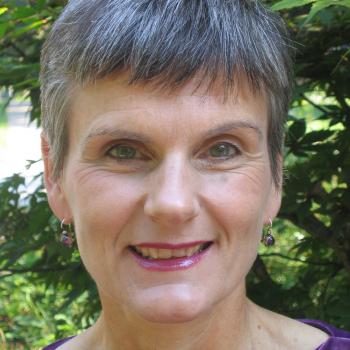Staff Scientist, HEP
Education: Diploma of Computing Studies (Melbourne University), Doctorate in Theoretical Physics (Melbourne University), B.S. with Honors (Melbourne University)
Hobbies: Skiing, climbing, sewing/knitting (makes all her own clothes, and has exhibited her work), beadwork, reading
Eve Kovacs is a Staff Scientist in Argonne National Laboratory’s High Energy Physics (HEP) division, where she runs simulations on the evolution of the universe as part of the computational cosmology group.
As a young child, Eve enjoyed school and studied hard, with her family encouraging her academic efforts. She initially planned to be a doctor since it was the only scientific field she was aware of, but she wanted to do more scientific research. “I had some interest in biology in middle school, but in those days, biology was more focused on description and much less quantitative than it is today,” she said.
In high school, Eve’s favorite classes were physics and mathematics, and she saw a path forward in academic research. “Once in college, I was able to narrow the choice to theoretical physics which combined my interests in physics and mathematics,” she said. “I tended to pick the subjects that I thought were most difficult, with the idea that I would learn the most with that approach.”
At Argonne, Eve works in HEP’s computational cosmology group to simulate the universe’s growth and understand the current state of the universe. “Almost everyone has looked up at the night sky and wondered how it and we came to be. This is one of the most fundamental questions that has fascinated people throughout human history,” she said. “People have intellectual curiosity, and this has driven the rise of all science, not just cosmology. In doing science, we are uncovering the fundamental truth about how the universe actually works.”
“Without doubt the most enjoyable aspect of what I do is solving problems,” Eve shared. “The challenge of trying to understand a question or conundrum, figuring out the steps to break the issue down, testing hypotheses, trying different approaches and thinking out of the box will never be boring to me. Interacting with my colleagues to brainstorm ideas for questions to explore is an exhilarating activity!”
As advice to students interested in science, technology, engineering and mathematics (STEM), Eve encourages them to pursue their interests, even if the fields are challenging. “It is really important to stay true to yourself and not let outside pressures and expectations deter you from pursuing a subject that captures your imagination,” she said. “A STEM major gives you widely applicable skills that prepare you for a variety of careers, so you don’t have to worry too much about whether you are choosing exactly the right major. However, problem-solving skills are invaluable in any career and, indeed, in life.”
